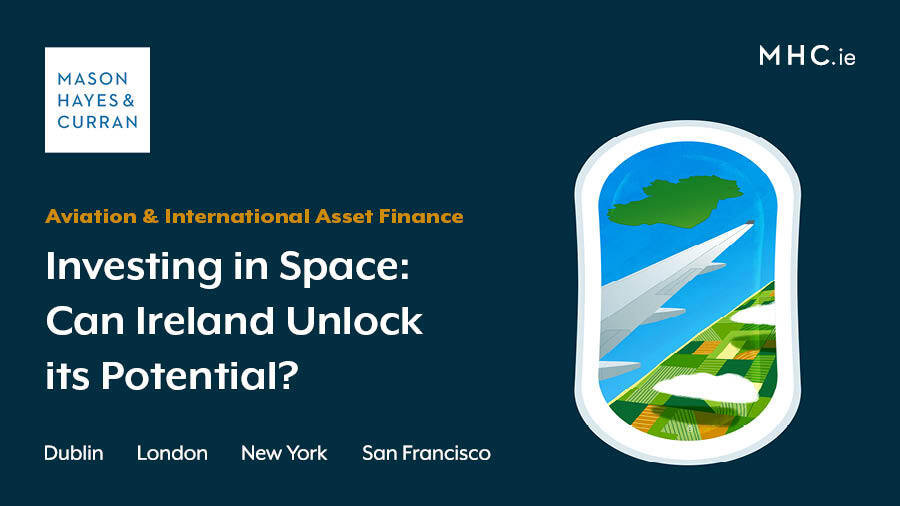
As the global space economy expands so does the variety of investment opportunities. Aviation, International Asset Finance partners, Julie-Ann Sherry and David McGovern explore the evolution of the space industry and how Ireland can compete in the global space economy.
The space industry is rapidly evolving from one dominated by the public sector to a model where private enterprise plays a significant role. As the space economy expands so does the variety of investment opportunities. The industry encompasses a diverse range of commercial players, such as providers of satellite broadband internet, space tourism and launch services.
Ireland has the capability and expertise to capture a larger portion of the global space industry.
Evolution of the space industry
The term “New Space” or “Space 4.0” has been coined to describe the shift in the global space industry. Previously, it was regarded as a predominantly government-funded public sector model. More recently, it can be described as an era characterised by increasing private investment and interaction between governments, the private sector, society and politics.
Several factors have ignited the interest of private investors in the global space sector, including:
- The deregulation of satellite communications and the opening of domestic markets which enable new entrants to the satellite telecommunications industries.
- Technology has improved, reducing launch costs and lowering barriers to accessing space.
- Recognition of the critical role space has in the global economy via (1) satellite communications and connectivity, (2) earth observation, and (3) navigation systems. Investment in space is likely to impact several industries beyond aerospace & defence, such as the IT hardware and communication, energy and agriculture sectors to name a few.
Morgan Stanley estimates that the global space industry could generate revenue of more than $1 trillion or more in 2040, up from $350 billion in 2020.
There are three stages of the space value chain attracting investment:
- Upstream: Spacecraft manufacturing and launch vehicles
- Midstream: Spacecraft operations and in-orbit management
- Downstream: Spacecraft-derived data application and services
Ireland and space
Ireland manages its investment in space primarily through the Department of Enterprise, Trade and Employment (DETE) and Enterprise Ireland. In 2019, Ireland’s National Space Strategy was unveiled. In 2023, the Irish Space Association (ISA) was launched to bring together various stakeholders in the Irish space industry.
Since Ireland joined the European Space Agency (ESA) in 1975, Irish industry and research groups have demonstrated the ability to provide innovative technologies for use in the European space programme. The aim of both the space strategy and the ISA is to showcase these abilities at an international level and capture a larger portion of the global space sector.
2023 saw notable achievements by the Irish space industry. Ireland’s first satellite, Eirsat-1 was launched successfully into space. Now in orbit, the satellite goes around the earth once every 100 minutes. The satellite has been picked up by ground stations around the world.
Dublin-based artificial intelligence innovator, Ubotica Technologies was awarded a NASA Group Achievement Award for being part of the ISS autonomy and instrument processing team on the Spaceborne Computing 2 on the International Space Station.
What next for Ireland’s space industry?
It’s an exciting time for Ireland’s growing space industry. Ireland has the expertise to be at the forefront of space innovation and technology. To date, the Irish space industry has excelled in upstream business. There is a desire by Irish stakeholders to develop downstream business, particularly earth observation, satellite communications and connectivity and navigation.
Similar to Ireland's world-leading aircraft finance industry, Ireland can offer an attractive business ecosystem for satellite leasing firms, space sector companies and investors alike. The appeal of doing business in Ireland is well documented:
- Ireland’s attractive tax position with a low rate of corporate tax and an excellent double tax treaty network.
- Ireland’s common law legal system. The types of transactions involved in financing space ventures vary. Equity finance secured and unsecured lending, and project finance structures have been utilised to raise capital. The legal environment in which these transactions take place is a major factor in ensuring that these transactions can be structured in a manner that reduces costs and risks.
- Ireland’s ability to support these transactions is demonstrated in the success of its global aviation industry. Our Aviation & International Asset Finance team advises on the financing, leasing and structuring of platforms for the aviation and shipping industries. Our expertise can similarly support domestic and international clients in the space industry on a range of matters from international asset financing and cross-border leasing, to regulation and alternative funding.
- Ireland’s membership of the EU, political stability and depth of talent in space innovation also demonstrate the appeal of doing business in Ireland for the space industry.
The Irish space sector is committed to growth. The National Space Strategy’s ambitious targets of doubling space-related revenue and employment in space companies by 2025 illustrates the Irish industry is in a new era of its own, one which recognises the potential it has to offer the global space economy.
For more information and expert advice on anticipated transactions in this sector, contact a member of our Aviation & International Asset Finance team.
The content of this article is provided for information purposes only and does not constitute legal or other advice.
Share this:

David McGovern
Partner, Head of Aviation and International Asset Finance
+353 86 128 4244 dmcgovern@mhc.ie



